Ethical Evaluation of 'Students and Sensors' Using Moral Theories
VerifiedAdded on 2023/06/04
|13
|1828
|65
Essay
AI Summary
This essay examines the ethical considerations surrounding the use of CatCards and sensor technology to monitor student behavior within an educational institution. It analyzes the case study 'Students and Sensors' through the lenses of four prominent ethical theories: utilitarianism, deontology, contract theory, and virtue ethics. The essay explores the potential benefits of such monitoring, such as improved student support and resource allocation, while also addressing concerns regarding privacy violations and potential misuse of data. Each ethical theory is applied to the case, providing a nuanced understanding of the moral complexities involved. The essay concludes with a recommendation against the unrestricted use of CatCards due to privacy concerns, advocating for informed consent and robust data security measures. The analysis emphasizes the need to balance the potential benefits of student monitoring with the fundamental rights and ethical considerations of individual privacy and autonomy. Desklib offers a platform for students to access similar solved assignments and resources.
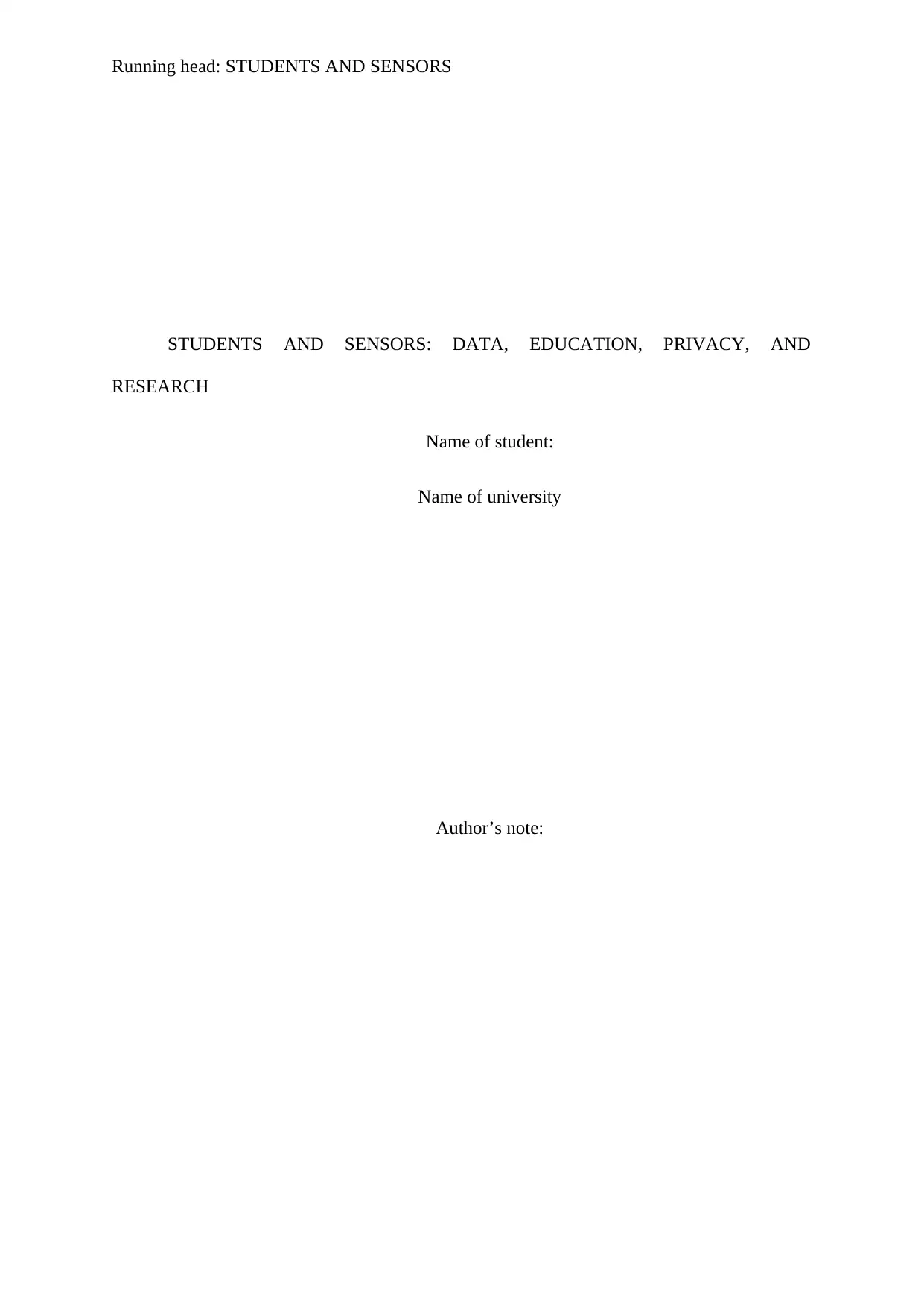
Running head: STUDENTS AND SENSORS
STUDENTS AND SENSORS: DATA, EDUCATION, PRIVACY, AND
RESEARCH
Name of student:
Name of university
Author’s note:
STUDENTS AND SENSORS: DATA, EDUCATION, PRIVACY, AND
RESEARCH
Name of student:
Name of university
Author’s note:
Paraphrase This Document
Need a fresh take? Get an instant paraphrase of this document with our AI Paraphraser
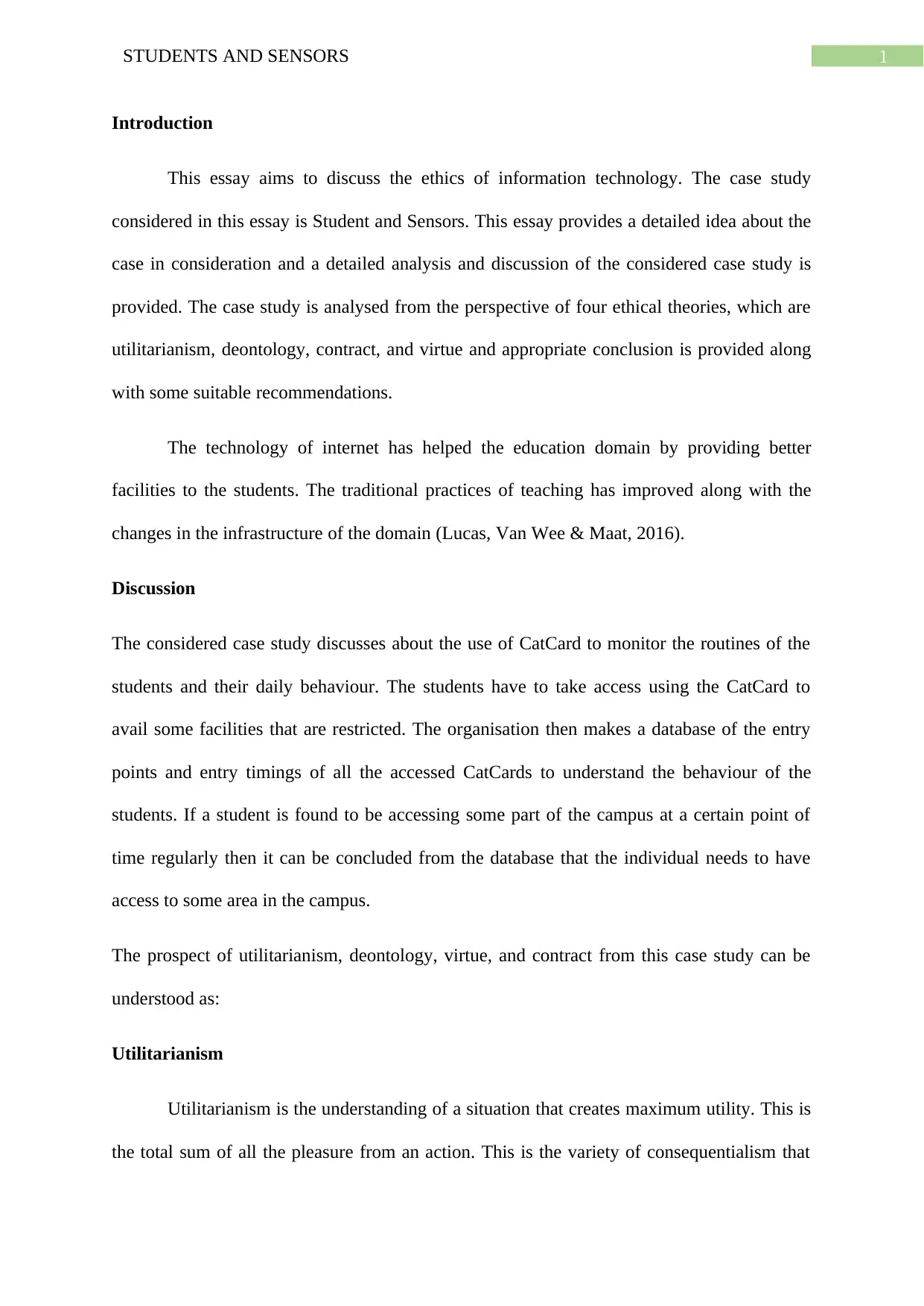
1STUDENTS AND SENSORS
Introduction
This essay aims to discuss the ethics of information technology. The case study
considered in this essay is Student and Sensors. This essay provides a detailed idea about the
case in consideration and a detailed analysis and discussion of the considered case study is
provided. The case study is analysed from the perspective of four ethical theories, which are
utilitarianism, deontology, contract, and virtue and appropriate conclusion is provided along
with some suitable recommendations.
The technology of internet has helped the education domain by providing better
facilities to the students. The traditional practices of teaching has improved along with the
changes in the infrastructure of the domain (Lucas, Van Wee & Maat, 2016).
Discussion
The considered case study discusses about the use of CatCard to monitor the routines of the
students and their daily behaviour. The students have to take access using the CatCard to
avail some facilities that are restricted. The organisation then makes a database of the entry
points and entry timings of all the accessed CatCards to understand the behaviour of the
students. If a student is found to be accessing some part of the campus at a certain point of
time regularly then it can be concluded from the database that the individual needs to have
access to some area in the campus.
The prospect of utilitarianism, deontology, virtue, and contract from this case study can be
understood as:
Utilitarianism
Utilitarianism is the understanding of a situation that creates maximum utility. This is
the total sum of all the pleasure from an action. This is the variety of consequentialism that
Introduction
This essay aims to discuss the ethics of information technology. The case study
considered in this essay is Student and Sensors. This essay provides a detailed idea about the
case in consideration and a detailed analysis and discussion of the considered case study is
provided. The case study is analysed from the perspective of four ethical theories, which are
utilitarianism, deontology, contract, and virtue and appropriate conclusion is provided along
with some suitable recommendations.
The technology of internet has helped the education domain by providing better
facilities to the students. The traditional practices of teaching has improved along with the
changes in the infrastructure of the domain (Lucas, Van Wee & Maat, 2016).
Discussion
The considered case study discusses about the use of CatCard to monitor the routines of the
students and their daily behaviour. The students have to take access using the CatCard to
avail some facilities that are restricted. The organisation then makes a database of the entry
points and entry timings of all the accessed CatCards to understand the behaviour of the
students. If a student is found to be accessing some part of the campus at a certain point of
time regularly then it can be concluded from the database that the individual needs to have
access to some area in the campus.
The prospect of utilitarianism, deontology, virtue, and contract from this case study can be
understood as:
Utilitarianism
Utilitarianism is the understanding of a situation that creates maximum utility. This is
the total sum of all the pleasure from an action. This is the variety of consequentialism that
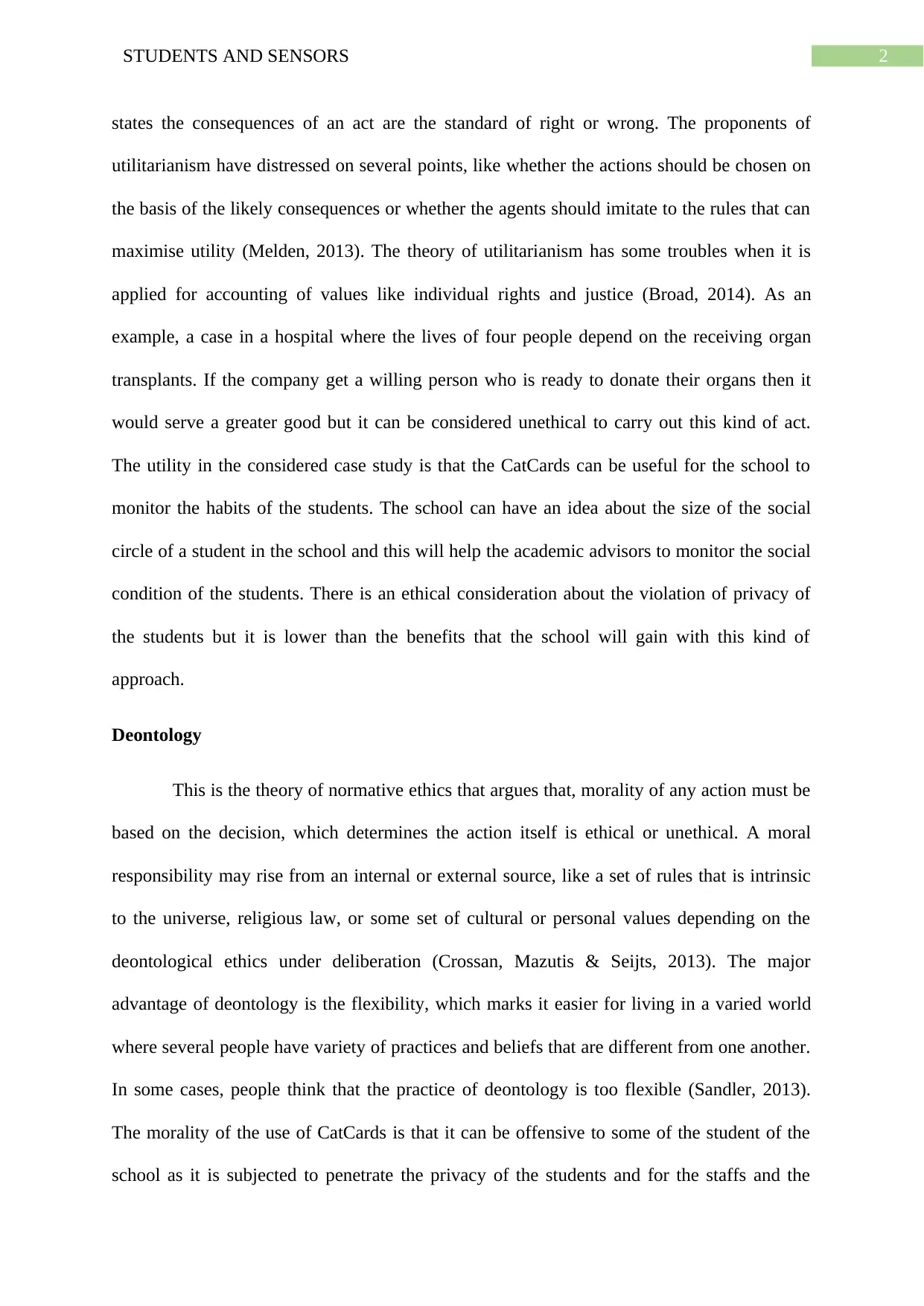
2STUDENTS AND SENSORS
states the consequences of an act are the standard of right or wrong. The proponents of
utilitarianism have distressed on several points, like whether the actions should be chosen on
the basis of the likely consequences or whether the agents should imitate to the rules that can
maximise utility (Melden, 2013). The theory of utilitarianism has some troubles when it is
applied for accounting of values like individual rights and justice (Broad, 2014). As an
example, a case in a hospital where the lives of four people depend on the receiving organ
transplants. If the company get a willing person who is ready to donate their organs then it
would serve a greater good but it can be considered unethical to carry out this kind of act.
The utility in the considered case study is that the CatCards can be useful for the school to
monitor the habits of the students. The school can have an idea about the size of the social
circle of a student in the school and this will help the academic advisors to monitor the social
condition of the students. There is an ethical consideration about the violation of privacy of
the students but it is lower than the benefits that the school will gain with this kind of
approach.
Deontology
This is the theory of normative ethics that argues that, morality of any action must be
based on the decision, which determines the action itself is ethical or unethical. A moral
responsibility may rise from an internal or external source, like a set of rules that is intrinsic
to the universe, religious law, or some set of cultural or personal values depending on the
deontological ethics under deliberation (Crossan, Mazutis & Seijts, 2013). The major
advantage of deontology is the flexibility, which marks it easier for living in a varied world
where several people have variety of practices and beliefs that are different from one another.
In some cases, people think that the practice of deontology is too flexible (Sandler, 2013).
The morality of the use of CatCards is that it can be offensive to some of the student of the
school as it is subjected to penetrate the privacy of the students and for the staffs and the
states the consequences of an act are the standard of right or wrong. The proponents of
utilitarianism have distressed on several points, like whether the actions should be chosen on
the basis of the likely consequences or whether the agents should imitate to the rules that can
maximise utility (Melden, 2013). The theory of utilitarianism has some troubles when it is
applied for accounting of values like individual rights and justice (Broad, 2014). As an
example, a case in a hospital where the lives of four people depend on the receiving organ
transplants. If the company get a willing person who is ready to donate their organs then it
would serve a greater good but it can be considered unethical to carry out this kind of act.
The utility in the considered case study is that the CatCards can be useful for the school to
monitor the habits of the students. The school can have an idea about the size of the social
circle of a student in the school and this will help the academic advisors to monitor the social
condition of the students. There is an ethical consideration about the violation of privacy of
the students but it is lower than the benefits that the school will gain with this kind of
approach.
Deontology
This is the theory of normative ethics that argues that, morality of any action must be
based on the decision, which determines the action itself is ethical or unethical. A moral
responsibility may rise from an internal or external source, like a set of rules that is intrinsic
to the universe, religious law, or some set of cultural or personal values depending on the
deontological ethics under deliberation (Crossan, Mazutis & Seijts, 2013). The major
advantage of deontology is the flexibility, which marks it easier for living in a varied world
where several people have variety of practices and beliefs that are different from one another.
In some cases, people think that the practice of deontology is too flexible (Sandler, 2013).
The morality of the use of CatCards is that it can be offensive to some of the student of the
school as it is subjected to penetrate the privacy of the students and for the staffs and the
⊘ This is a preview!⊘
Do you want full access?
Subscribe today to unlock all pages.

Trusted by 1+ million students worldwide
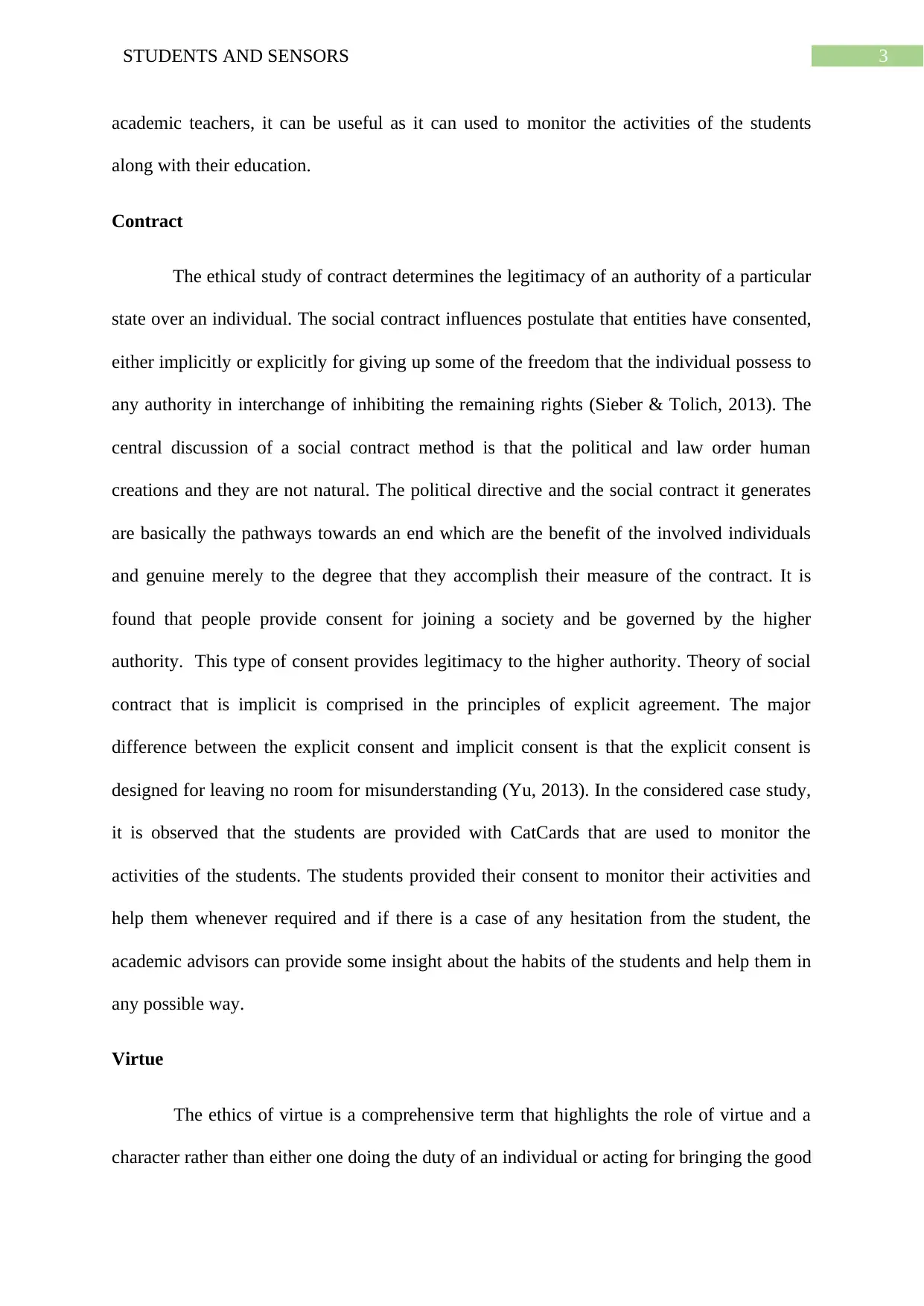
3STUDENTS AND SENSORS
academic teachers, it can be useful as it can used to monitor the activities of the students
along with their education.
Contract
The ethical study of contract determines the legitimacy of an authority of a particular
state over an individual. The social contract influences postulate that entities have consented,
either implicitly or explicitly for giving up some of the freedom that the individual possess to
any authority in interchange of inhibiting the remaining rights (Sieber & Tolich, 2013). The
central discussion of a social contract method is that the political and law order human
creations and they are not natural. The political directive and the social contract it generates
are basically the pathways towards an end which are the benefit of the involved individuals
and genuine merely to the degree that they accomplish their measure of the contract. It is
found that people provide consent for joining a society and be governed by the higher
authority. This type of consent provides legitimacy to the higher authority. Theory of social
contract that is implicit is comprised in the principles of explicit agreement. The major
difference between the explicit consent and implicit consent is that the explicit consent is
designed for leaving no room for misunderstanding (Yu, 2013). In the considered case study,
it is observed that the students are provided with CatCards that are used to monitor the
activities of the students. The students provided their consent to monitor their activities and
help them whenever required and if there is a case of any hesitation from the student, the
academic advisors can provide some insight about the habits of the students and help them in
any possible way.
Virtue
The ethics of virtue is a comprehensive term that highlights the role of virtue and a
character rather than either one doing the duty of an individual or acting for bringing the good
academic teachers, it can be useful as it can used to monitor the activities of the students
along with their education.
Contract
The ethical study of contract determines the legitimacy of an authority of a particular
state over an individual. The social contract influences postulate that entities have consented,
either implicitly or explicitly for giving up some of the freedom that the individual possess to
any authority in interchange of inhibiting the remaining rights (Sieber & Tolich, 2013). The
central discussion of a social contract method is that the political and law order human
creations and they are not natural. The political directive and the social contract it generates
are basically the pathways towards an end which are the benefit of the involved individuals
and genuine merely to the degree that they accomplish their measure of the contract. It is
found that people provide consent for joining a society and be governed by the higher
authority. This type of consent provides legitimacy to the higher authority. Theory of social
contract that is implicit is comprised in the principles of explicit agreement. The major
difference between the explicit consent and implicit consent is that the explicit consent is
designed for leaving no room for misunderstanding (Yu, 2013). In the considered case study,
it is observed that the students are provided with CatCards that are used to monitor the
activities of the students. The students provided their consent to monitor their activities and
help them whenever required and if there is a case of any hesitation from the student, the
academic advisors can provide some insight about the habits of the students and help them in
any possible way.
Virtue
The ethics of virtue is a comprehensive term that highlights the role of virtue and a
character rather than either one doing the duty of an individual or acting for bringing the good
Paraphrase This Document
Need a fresh take? Get an instant paraphrase of this document with our AI Paraphraser
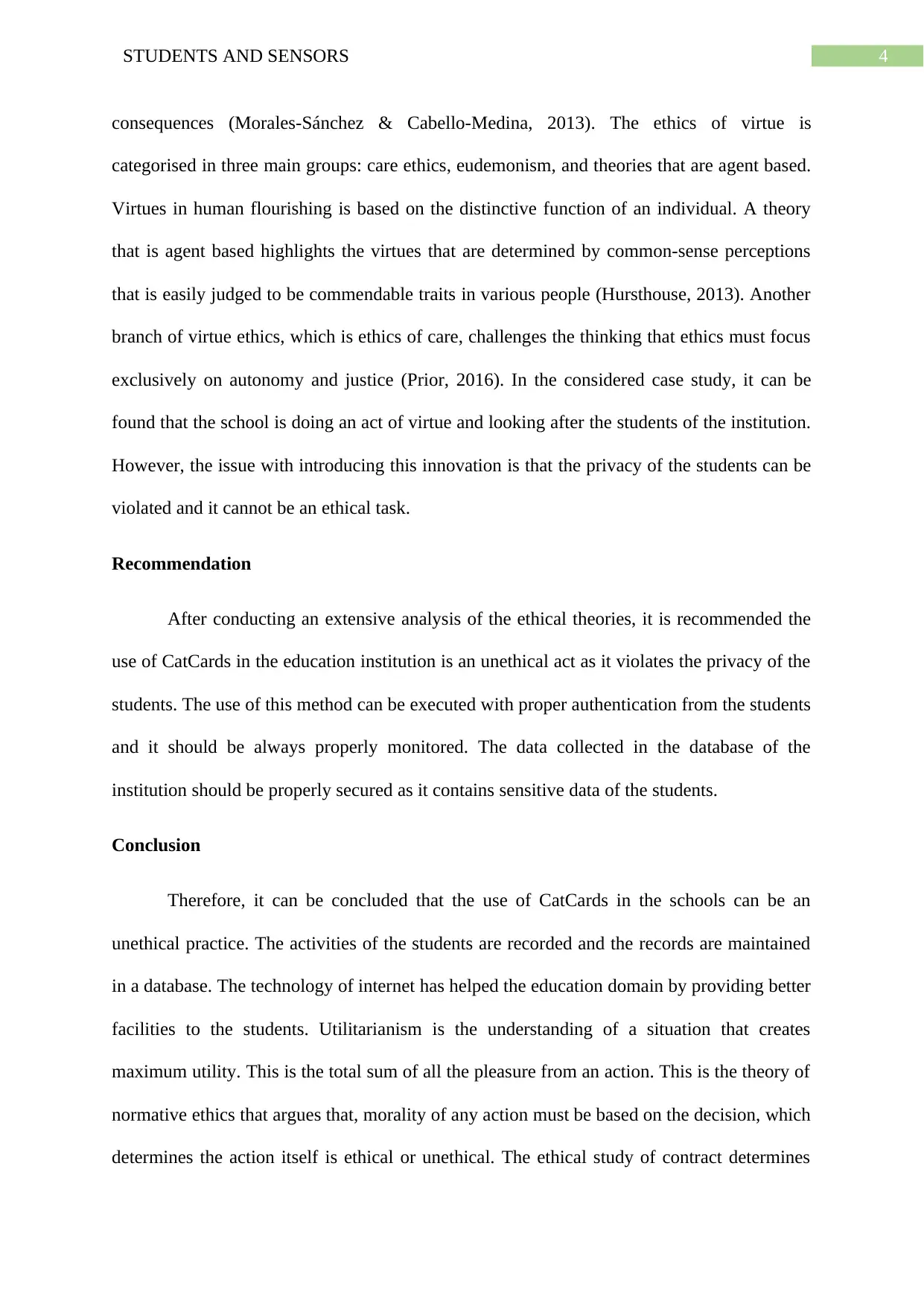
4STUDENTS AND SENSORS
consequences (Morales-Sánchez & Cabello-Medina, 2013). The ethics of virtue is
categorised in three main groups: care ethics, eudemonism, and theories that are agent based.
Virtues in human flourishing is based on the distinctive function of an individual. A theory
that is agent based highlights the virtues that are determined by common-sense perceptions
that is easily judged to be commendable traits in various people (Hursthouse, 2013). Another
branch of virtue ethics, which is ethics of care, challenges the thinking that ethics must focus
exclusively on autonomy and justice (Prior, 2016). In the considered case study, it can be
found that the school is doing an act of virtue and looking after the students of the institution.
However, the issue with introducing this innovation is that the privacy of the students can be
violated and it cannot be an ethical task.
Recommendation
After conducting an extensive analysis of the ethical theories, it is recommended the
use of CatCards in the education institution is an unethical act as it violates the privacy of the
students. The use of this method can be executed with proper authentication from the students
and it should be always properly monitored. The data collected in the database of the
institution should be properly secured as it contains sensitive data of the students.
Conclusion
Therefore, it can be concluded that the use of CatCards in the schools can be an
unethical practice. The activities of the students are recorded and the records are maintained
in a database. The technology of internet has helped the education domain by providing better
facilities to the students. Utilitarianism is the understanding of a situation that creates
maximum utility. This is the total sum of all the pleasure from an action. This is the theory of
normative ethics that argues that, morality of any action must be based on the decision, which
determines the action itself is ethical or unethical. The ethical study of contract determines
consequences (Morales-Sánchez & Cabello-Medina, 2013). The ethics of virtue is
categorised in three main groups: care ethics, eudemonism, and theories that are agent based.
Virtues in human flourishing is based on the distinctive function of an individual. A theory
that is agent based highlights the virtues that are determined by common-sense perceptions
that is easily judged to be commendable traits in various people (Hursthouse, 2013). Another
branch of virtue ethics, which is ethics of care, challenges the thinking that ethics must focus
exclusively on autonomy and justice (Prior, 2016). In the considered case study, it can be
found that the school is doing an act of virtue and looking after the students of the institution.
However, the issue with introducing this innovation is that the privacy of the students can be
violated and it cannot be an ethical task.
Recommendation
After conducting an extensive analysis of the ethical theories, it is recommended the
use of CatCards in the education institution is an unethical act as it violates the privacy of the
students. The use of this method can be executed with proper authentication from the students
and it should be always properly monitored. The data collected in the database of the
institution should be properly secured as it contains sensitive data of the students.
Conclusion
Therefore, it can be concluded that the use of CatCards in the schools can be an
unethical practice. The activities of the students are recorded and the records are maintained
in a database. The technology of internet has helped the education domain by providing better
facilities to the students. Utilitarianism is the understanding of a situation that creates
maximum utility. This is the total sum of all the pleasure from an action. This is the theory of
normative ethics that argues that, morality of any action must be based on the decision, which
determines the action itself is ethical or unethical. The ethical study of contract determines
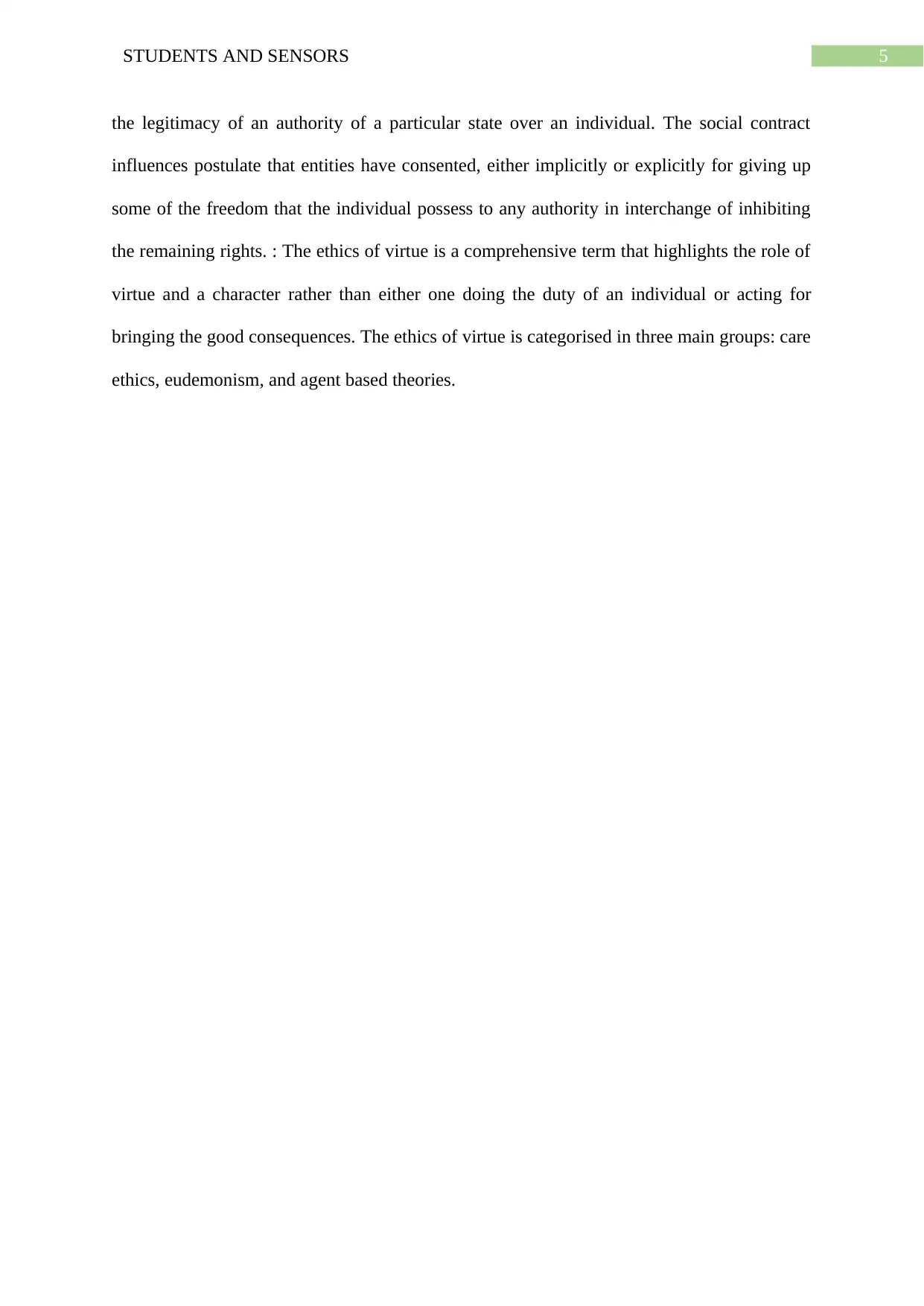
5STUDENTS AND SENSORS
the legitimacy of an authority of a particular state over an individual. The social contract
influences postulate that entities have consented, either implicitly or explicitly for giving up
some of the freedom that the individual possess to any authority in interchange of inhibiting
the remaining rights. : The ethics of virtue is a comprehensive term that highlights the role of
virtue and a character rather than either one doing the duty of an individual or acting for
bringing the good consequences. The ethics of virtue is categorised in three main groups: care
ethics, eudemonism, and agent based theories.
the legitimacy of an authority of a particular state over an individual. The social contract
influences postulate that entities have consented, either implicitly or explicitly for giving up
some of the freedom that the individual possess to any authority in interchange of inhibiting
the remaining rights. : The ethics of virtue is a comprehensive term that highlights the role of
virtue and a character rather than either one doing the duty of an individual or acting for
bringing the good consequences. The ethics of virtue is categorised in three main groups: care
ethics, eudemonism, and agent based theories.
⊘ This is a preview!⊘
Do you want full access?
Subscribe today to unlock all pages.

Trusted by 1+ million students worldwide
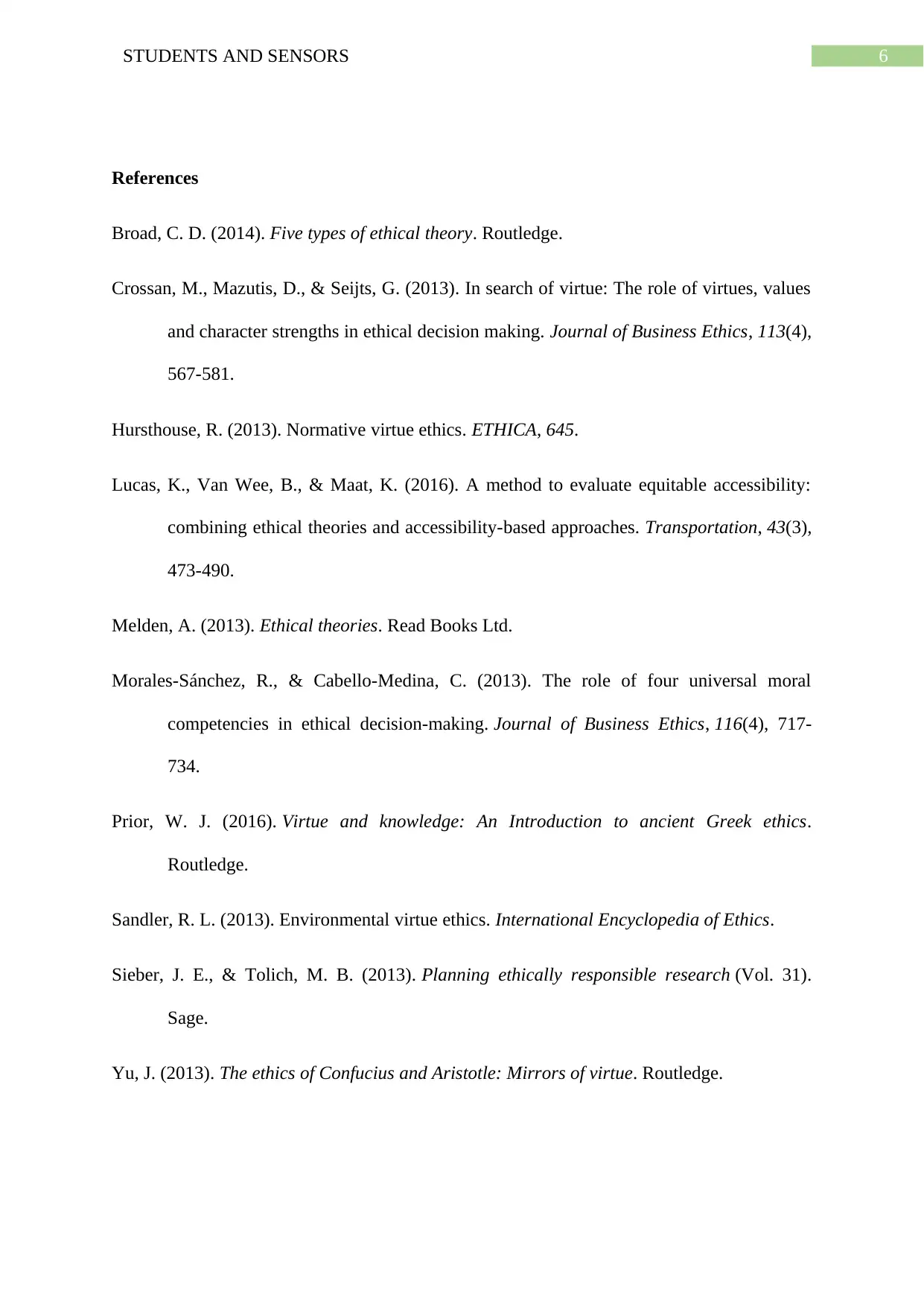
6STUDENTS AND SENSORS
References
Broad, C. D. (2014). Five types of ethical theory. Routledge.
Crossan, M., Mazutis, D., & Seijts, G. (2013). In search of virtue: The role of virtues, values
and character strengths in ethical decision making. Journal of Business Ethics, 113(4),
567-581.
Hursthouse, R. (2013). Normative virtue ethics. ETHICA, 645.
Lucas, K., Van Wee, B., & Maat, K. (2016). A method to evaluate equitable accessibility:
combining ethical theories and accessibility-based approaches. Transportation, 43(3),
473-490.
Melden, A. (2013). Ethical theories. Read Books Ltd.
Morales-Sánchez, R., & Cabello-Medina, C. (2013). The role of four universal moral
competencies in ethical decision-making. Journal of Business Ethics, 116(4), 717-
734.
Prior, W. J. (2016). Virtue and knowledge: An Introduction to ancient Greek ethics.
Routledge.
Sandler, R. L. (2013). Environmental virtue ethics. International Encyclopedia of Ethics.
Sieber, J. E., & Tolich, M. B. (2013). Planning ethically responsible research (Vol. 31).
Sage.
Yu, J. (2013). The ethics of Confucius and Aristotle: Mirrors of virtue. Routledge.
References
Broad, C. D. (2014). Five types of ethical theory. Routledge.
Crossan, M., Mazutis, D., & Seijts, G. (2013). In search of virtue: The role of virtues, values
and character strengths in ethical decision making. Journal of Business Ethics, 113(4),
567-581.
Hursthouse, R. (2013). Normative virtue ethics. ETHICA, 645.
Lucas, K., Van Wee, B., & Maat, K. (2016). A method to evaluate equitable accessibility:
combining ethical theories and accessibility-based approaches. Transportation, 43(3),
473-490.
Melden, A. (2013). Ethical theories. Read Books Ltd.
Morales-Sánchez, R., & Cabello-Medina, C. (2013). The role of four universal moral
competencies in ethical decision-making. Journal of Business Ethics, 116(4), 717-
734.
Prior, W. J. (2016). Virtue and knowledge: An Introduction to ancient Greek ethics.
Routledge.
Sandler, R. L. (2013). Environmental virtue ethics. International Encyclopedia of Ethics.
Sieber, J. E., & Tolich, M. B. (2013). Planning ethically responsible research (Vol. 31).
Sage.
Yu, J. (2013). The ethics of Confucius and Aristotle: Mirrors of virtue. Routledge.
Paraphrase This Document
Need a fresh take? Get an instant paraphrase of this document with our AI Paraphraser

7STUDENTS AND SENSORS

8STUDENTS AND SENSORS
⊘ This is a preview!⊘
Do you want full access?
Subscribe today to unlock all pages.

Trusted by 1+ million students worldwide

9STUDENTS AND SENSORS
Paraphrase This Document
Need a fresh take? Get an instant paraphrase of this document with our AI Paraphraser

10STUDENTS AND SENSORS

11STUDENTS AND SENSORS
⊘ This is a preview!⊘
Do you want full access?
Subscribe today to unlock all pages.

Trusted by 1+ million students worldwide
1 out of 13
Related Documents
Your All-in-One AI-Powered Toolkit for Academic Success.
+13062052269
info@desklib.com
Available 24*7 on WhatsApp / Email
![[object Object]](/_next/static/media/star-bottom.7253800d.svg)
Unlock your academic potential
Copyright © 2020–2026 A2Z Services. All Rights Reserved. Developed and managed by ZUCOL.

